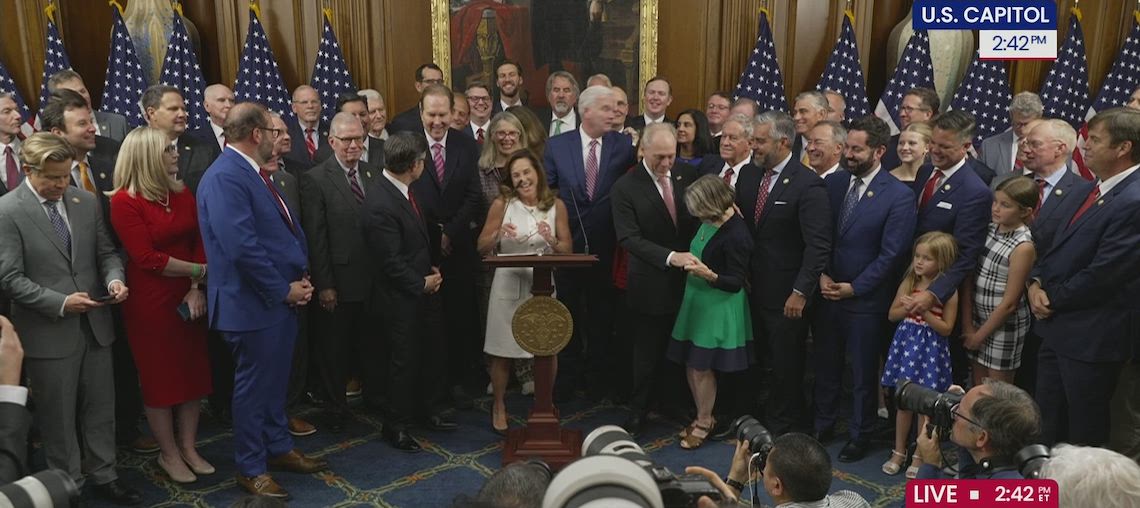
Members of the House GOP gather to speak with reporters July 3, 2025, upon the passage of Pres. Trump's signature "Big, Beautiful Bill." CSPAN screen shot
Written by Frank Lopez
The final affirmative vote of the Trump Administration’s “Big Beautiful Bill” on Thursday has garnered reactions from local elected officials — some praising and others denouncing passage of the budget reconciliation bill.
The House passed the spending-and-tax bill in a 218-214 vote, advancing several of President Trump’s signature policies of his second-term agenda.
A major part of the bill extends Trump’s 2017 Tax Cuts and Jobs Act, slated to sunset at the end of 2025.
The bill makes most of the of the tax cuts permanent and increases spending for border security and national defense.
The “Big Beautiful Bill” is partially paid for by cuts to health care and nutrition programs, including Medicaid and the Supplemental Nutrition Assistant Program (SNAP), which provides food assistance to families.
According to Congressional Budget Office estimates, the bill adds $3.4 trillion to federal deficits in the next 10 years and will slash health insurance for millions.
Rep. David Valadao (R-Hanford) voted in favor, releasing a statement Thursday saying it “was not an easy decision.” He faced national scrutiny for his vote on the bill, with his constituents heavily reliant on federally funded health programs.
In his statement, Valadao said the bill will help the rural regions of the country, including in the Central Valley. He cited concessions made to support the district.
“After numerous conversations, an additional $25 billion was added to the newly established Rural Health Transformation Program — which will help to support rural and other at-risk hospitals in my district — bringing the total to $50 billion. I’ve been assured by the administration that it will be structured in a way that benefits our providers and keeps our hospitals and communities running,” Valadao said.
Rep. Vince Fong (R-Bakersfield) voted to pass the bill, saying the legislation delivers for the Central Valley.
“This landmark legislation delivers immediate and meaningful results for the Central Valley — providing much-needed tax relief for working families and small businesses, supporting our farmers and ranchers, securing our borders, and investing in the water and energy infrastructure that drives our local economy,” said Fong.
According to a news release from Fong, the bill includes a $1-billion investment in water storage and conveyance and injects $285 million into the Supplemental Agricultural Trade Promotion Program every year from 2027 onward.
It will also make permanent and increase the so-called “Death Tax” exemption for 41,690 local small businesses so they can be passed to the next generation.
Rep. Jim Costa (D-Fresno) was a “no” vote. He said Republicans are putting billionaires and big corporations first at the expense of the people of the San Joaquin Valley.
“Healthcare is essential as the majority of the people that I represent rely on Medicaid, Medicare and the Supplemental Nutrition Assistance Program (SNAP). These vital safety nets ensure families can access food, healthcare, and stable housing. But this bill guts those services and puts rural hospitals at risk of closure, while adding $4 trillion to the deficit. That’s not fiscal responsibility—it’s a direct attack on the communities I represent,” said Costa in a statement Thursday.
According to the statement, 51,233 people in Costa’s district will lose Medicaid (Medi-Cal) and 9,700 people in the district will lose their health insurance through the Affordable Care Act.
On his X.com account, Gavin Newsom denounced the passing of the bill, calling it the “ultimate betrayal.”








